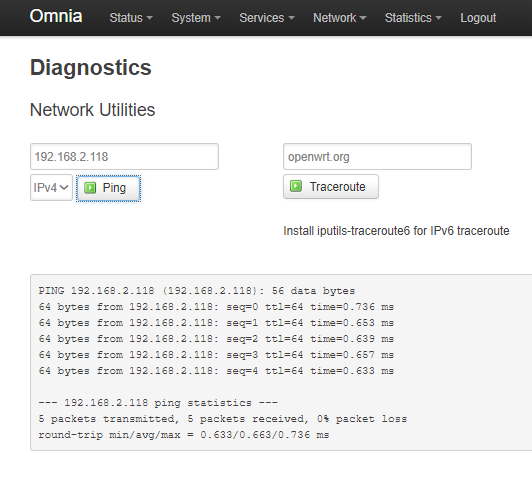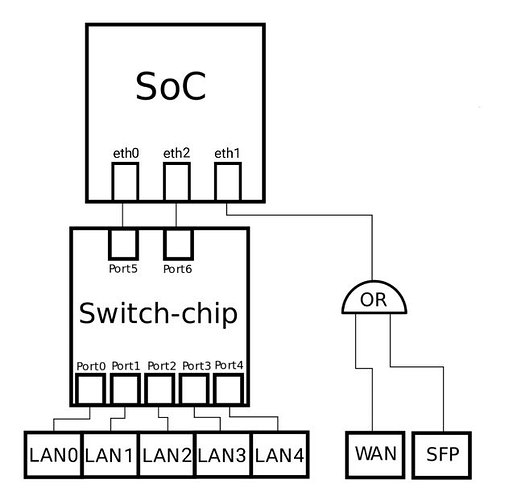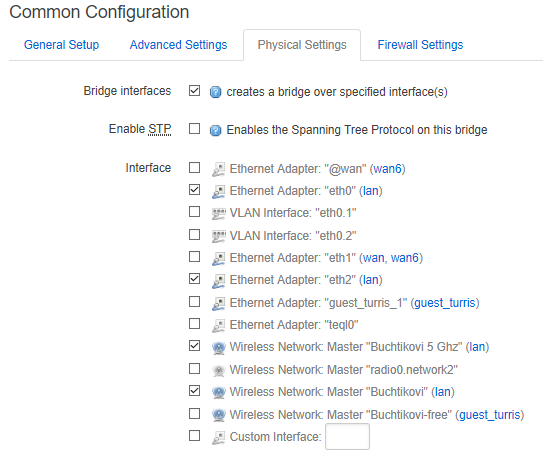I tried, but found nothing. I did ping from my laptop, via wifi (otherwise I can’t capture transit traffic on omnia), via omnia to a PC.
Here is the log:
Source:
64 bytes from 192.168.1.2: icmp_seq=314 ttl=64 time=3.06 ms
no answer yet for icmp_seq=315
64 bytes from 192.168.1.2: icmp_seq=316 ttl=64 time=2.85 ms
64 bytes from 192.168.1.2: icmp_seq=317 ttl=64 time=2.97 ms
64 bytes from 192.168.1.2: icmp_seq=318 ttl=64 time=2.54 ms
^C
— 192.168.1.2 ping statistics —
318 packets transmitted, 316 received, 0% packet loss, time 317564ms
rtt min/avg/max/mdev = 0.821/2.700/75.581/4.465 ms
Source:
64 bytes from 192.168.1.2: icmp_seq=314 ttl=64 time=3.06 ms
no answer yet for icmp_seq=315
64 bytes from 192.168.1.2: icmp_seq=316 ttl=64 time=2.85 ms
64 bytes from 192.168.1.2: icmp_seq=317 ttl=64 time=2.97 ms
64 bytes from 192.168.1.2: icmp_seq=318 ttl=64 time=2.54 ms
^C
— 192.168.1.2 ping statistics —
318 packets transmitted, 316 received, 0% packet loss, time 317564ms
rtt min/avg/max/mdev = 0.821/2.700/75.581/4.465 ms
Router (omnia turris):
15:23:15.445507 xx:xx:xx:xx:xx:x1 > xx:xx:xx:xx:xx:x2, ethertype IPv4 (0x0800), length 98: 192.168.1.118 > 192.168.1.2: ICMP echo request, id 31171, seq 312, length 64
15:23:15.445808 xx:xx:xx:xx:xx:x2 > xx:xx:xx:xx:xx:x1, ethertype IPv4 (0x0800), length 98: 192.168.1.2 > 192.168.1.118: ICMP echo reply, id 31171, seq 312, length 64
15:23:16.447507 xx:xx:xx:xx:xx:x1 > xx:xx:xx:xx:xx:x2, ethertype IPv4 (0x0800), length 98: 192.168.1.118 > 192.168.1.2: ICMP echo request, id 31171, seq 313, length 64
15:23:16.447864 xx:xx:xx:xx:xx:x2 > xx:xx:xx:xx:xx:x1, ethertype IPv4 (0x0800), length 98: 192.168.1.2 > 192.168.1.118: ICMP echo reply, id 31171, seq 313, length 64
15:23:17.449571 xx:xx:xx:xx:xx:x1 > xx:xx:xx:xx:xx:x2, ethertype IPv4 (0x0800), length 98: 192.168.1.118 > 192.168.1.2: ICMP echo request, id 31171, seq 314, length 64
15:23:17.449899 xx:xx:xx:xx:xx:x2 > xx:xx:xx:xx:xx:x1, ethertype IPv4 (0x0800), length 98: 192.168.1.2 > 192.168.1.118: ICMP echo reply, id 31171, seq 314, length 64
15:23:18.450562 xx:xx:xx:xx:xx:x1 > xx:xx:xx:xx:xx:x2, ethertype IPv4 (0x0800), length 98: 192.168.1.118 > 192.168.1.2: ICMP echo request, id 31171, seq 315, length 64
15:23:19.461441 xx:xx:xx:xx:xx:x1 > xx:xx:xx:xx:xx:x2, ethertype IPv4 (0x0800), length 98: 192.168.1.118 > 192.168.1.2: ICMP echo request, id 31171, seq 316, length 64
15:23:19.461748 xx:xx:xx:xx:xx:x2 > xx:xx:xx:xx:xx:x1, ethertype IPv4 (0x0800), length 98: 192.168.1.2 > 192.168.1.118: ICMP echo reply, id 31171, seq 316, length 64
Destination:
15:23:15.462800 xx:xx:xx:xx:xx:x1 > xx:xx:xx:xx:xx:x2, ethertype IPv4 (0x0800), length 98: 192.168.1.118 > 192.168.1.2: ICMP echo request, id 31171, seq 312, length 64
15:23:15.462931 xx:xx:xx:xx:xx:x2 > xx:xx:xx:xx:xx:x1, ethertype IPv4 (0x0800), length 98: 192.168.1.2 > 192.168.1.118: ICMP echo reply, id 31171, seq 312, length 64
15:23:16.464841 xx:xx:xx:xx:xx:x1 > xx:xx:xx:xx:xx:x2, ethertype IPv4 (0x0800), length 98: 192.168.1.118 > 192.168.1.2: ICMP echo request, id 31171, seq 313, length 64
15:23:16.464980 xx:xx:xx:xx:xx:x2 > xx:xx:xx:xx:xx:x1, ethertype IPv4 (0x0800), length 98: 192.168.1.2 > 192.168.1.118: ICMP echo reply, id 31171, seq 313, length 64
15:23:17.466897 xx:xx:xx:xx:xx:x1 > xx:xx:xx:xx:xx:x2, ethertype IPv4 (0x0800), length 98: 192.168.1.118 > 192.168.1.2: ICMP echo request, id 31171, seq 314, length 64
15:23:17.467012 xx:xx:xx:xx:xx:x2 > xx:xx:xx:xx:xx:x1, ethertype IPv4 (0x0800), length 98: 192.168.1.2 > 192.168.1.118: ICMP echo reply, id 31171, seq 314, length 64
15:23:19.478749 xx:xx:xx:xx:xx:x1 > xx:xx:xx:xx:xx:x2, ethertype IPv4 (0x0800), length 98: 192.168.1.118 > 192.168.1.2: ICMP echo request, id 31171, seq 316, length 64
15:23:19.478860 xx:xx:xx:xx:xx:x2 > xx:xx:xx:xx:xx:x1, ethertype IPv4 (0x0800), length 98: 192.168.1.2 > 192.168.1.118: ICMP echo reply, id 31171, seq 316, length 64
Router (omnia turris):
15:23:15.445507 xx:xx:xx:xx:xx:x1 > xx:xx:xx:xx:xx:x2, ethertype IPv4 (0x0800), length 98: 192.168.1.118 > 192.168.1.2: ICMP echo request, id 31171, seq 312, length 64
15:23:15.445808 xx:xx:xx:xx:xx:x2 > xx:xx:xx:xx:xx:x1, ethertype IPv4 (0x0800), length 98: 192.168.1.2 > 192.168.1.118: ICMP echo reply, id 31171, seq 312, length 64
15:23:16.447507 xx:xx:xx:xx:xx:x1 > xx:xx:xx:xx:xx:x2, ethertype IPv4 (0x0800), length 98: 192.168.1.118 > 192.168.1.2: ICMP echo request, id 31171, seq 313, length 64
15:23:16.447864 xx:xx:xx:xx:xx:x2 > xx:xx:xx:xx:xx:x1, ethertype IPv4 (0x0800), length 98: 192.168.1.2 > 192.168.1.118: ICMP echo reply, id 31171, seq 313, length 64
15:23:17.449571 xx:xx:xx:xx:xx:x1 > xx:xx:xx:xx:xx:x2, ethertype IPv4 (0x0800), length 98: 192.168.1.118 > 192.168.1.2: ICMP echo request, id 31171, seq 314, length 64
15:23:17.449899 xx:xx:xx:xx:xx:x2 > xx:xx:xx:xx:xx:x1, ethertype IPv4 (0x0800), length 98: 192.168.1.2 > 192.168.1.118: ICMP echo reply, id 31171, seq 314, length 64
15:23:18.450562 xx:xx:xx:xx:xx:x1 > xx:xx:xx:xx:xx:x2, ethertype IPv4 (0x0800), length 98: 192.168.1.118 > 192.168.1.2: ICMP echo request, id 31171, seq 315, length 64
15:23:19.461441 xx:xx:xx:xx:xx:x1 > xx:xx:xx:xx:xx:x2, ethertype IPv4 (0x0800), length 98: 192.168.1.118 > 192.168.1.2: ICMP echo request, id 31171, seq 316, length 64
15:23:19.461748 xx:xx:xx:xx:xx:x2 > xx:xx:xx:xx:xx:x1, ethertype IPv4 (0x0800), length 98: 192.168.1.2 > 192.168.1.118: ICMP echo reply, id 31171, seq 316, length 64
Destination:
15:23:15.462800 xx:xx:xx:xx:xx:x1 > xx:xx:xx:xx:xx:x2, ethertype IPv4 (0x0800), length 98: 192.168.1.118 > 192.168.1.2: ICMP echo request, id 31171, seq 312, length 64
15:23:15.462931 xx:xx:xx:xx:xx:x2 > xx:xx:xx:xx:xx:x1, ethertype IPv4 (0x0800), length 98: 192.168.1.2 > 192.168.1.118: ICMP echo reply, id 31171, seq 312, length 64
15:23:16.464841 xx:xx:xx:xx:xx:x1 > xx:xx:xx:xx:xx:x2, ethertype IPv4 (0x0800), length 98: 192.168.1.118 > 192.168.1.2: ICMP echo request, id 31171, seq 313, length 64
15:23:16.464980 xx:xx:xx:xx:xx:x2 > xx:xx:xx:xx:xx:x1, ethertype IPv4 (0x0800), length 98: 192.168.1.2 > 192.168.1.118: ICMP echo reply, id 31171, seq 313, length 64
15:23:17.466897 xx:xx:xx:xx:xx:x1 > xx:xx:xx:xx:xx:x2, ethertype IPv4 (0x0800), length 98: 192.168.1.118 > 192.168.1.2: ICMP echo request, id 31171, seq 314, length 64
15:23:17.467012 xx:xx:xx:xx:xx:x2 > xx:xx:xx:xx:xx:x1, ethertype IPv4 (0x0800), length 98: 192.168.1.2 > 192.168.1.118: ICMP echo reply, id 31171, seq 314, length 64
15:23:19.478749 xx:xx:xx:xx:xx:x1 > xx:xx:xx:xx:xx:x2, ethertype IPv4 (0x0800), length 98: 192.168.1.118 > 192.168.1.2: ICMP echo request, id 31171, seq 316, length 64
15:23:19.478860 xx:xx:xx:xx:xx:x2 > xx:xx:xx:xx:xx:x1, ethertype IPv4 (0x0800), length 98: 192.168.1.2 > 192.168.1.118: ICMP echo reply, id 31171, seq 316, length 64
I don’t print packages content here because there are nothing interesting.
 P.S. I tried different port, cables and different PC connected, but still see some losses.
P.S. I tried different port, cables and different PC connected, but still see some losses.

